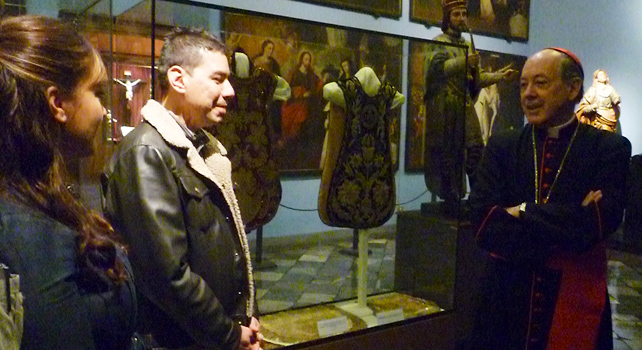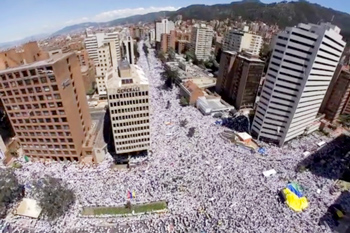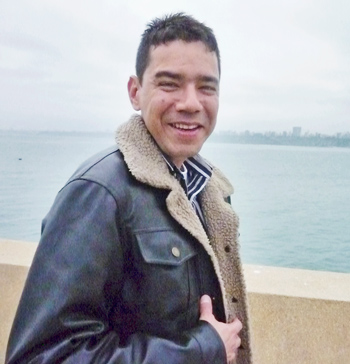Long before the Arab Spring, Oscar Morales was among the first people to use Facebook to mount a successful large-scale political activism effort.

When Oscar Morales graduated college at 21 he became a civil engineer working mostly in construction in his native Colombia. Around that time he became one of the early adopters of the Internet in Colombia. “I’m talking about 1996,” Morales says a decade and a half later. “This was the Internet in its very early phase. It wasn’t even the time of Google. It was the time of AltaVista, Yahoo. But I was a native. I knew about it the moment it started to happen in Colombia.” As Morales started to experiment with this new technology, he became a self-described computer geek.
For most of Oscar’s life, a radical revolutionary network called the Revolutionary Armed Forces of Colombia--more commonly known as FARC--had been terrorizing Colombia. FARC had been responsible for an ongoing series of bombings and kidnappings for several decades. Oscar had been aware of this frightening disruption of Colombian society, but as a civil engineer, he had never thought he could do anything about it. Nevertheless, like many Colombians, he hoped someday the violence would end.
By 2008, Facebook was rapidly growing in Colombia and much of Latin America. Morales, as an early adopter, began to explore the power of social media. New attention was also being focused on FARC at that moment, since the terrorist violence was continuing to escalate. In 2002, FARC had taken hostage a group of 700 people that included then Colombian presidential candidate Ingrid Betancourt and her campaign manager, Clara Rojas. In late 2007, the public learned that Rojas had given birth to a child, Emmanuel, while in captivity. They also learned that Emmanuel had been kept in captivity separate from his mother. This news sparked a national outcry in Colombia. “I was not supposed to be the person that I am,” Morales says. “Ever since I was a kid, I’ve been a patriot. I learned about Colombia’s history, our past, the creation of our constitution, and everything there is to know about the country. But when you are aware of the political situation and the social situation of your own country, it’s hard not to become an activist. It’s hard to ignore that something is wrong.”
 Morales decided to take action. To do that he decided he should use this new exciting social network, Facebook. On January 4, 2008, he created a Facebook group called “One Million Voices Against FARC.” The group was dedicated to bringing down FARC and to demanding the release of several hundred hostages. Just hours after the Facebook group launched, Morales watched the membership climb to 1,500 members. The next day there were 4,000. By the end of the first week: 100,000. Several days later, FARC agreed to a humanitarian release of Rojas, Emmanuel, and one other hostage.
Morales decided to take action. To do that he decided he should use this new exciting social network, Facebook. On January 4, 2008, he created a Facebook group called “One Million Voices Against FARC.” The group was dedicated to bringing down FARC and to demanding the release of several hundred hostages. Just hours after the Facebook group launched, Morales watched the membership climb to 1,500 members. The next day there were 4,000. By the end of the first week: 100,000. Several days later, FARC agreed to a humanitarian release of Rojas, Emmanuel, and one other hostage. Then Morales took the action offline. He invited all the online supporters to march in the streets on February 4 to press their goals. Rallies across Colombia turned out hundreds of thousands of people. Some estimates have concluded that millions of protestors took part. The national media picked up on the movement and took up the cause. Soon the movement was endorsed by Colombia’s then President Álvaro Uribe. Millions of people around the world took to the streets in solidarity protests. The momentum that continued to build was no doubt one of the factors that emboldened the rescue mission in July 2008 that finally freed Betancourt and many others.
About This Series

Fast Company profiles the personalities behind the ideas that shake up business as usual. Discover more about these pioneers here.
Long before the Arab Spring, Oscar Morales was among the first people to use Facebook to mount a successful large-scale political activism effort. As such, Facebook reached out to him, excited to tell his story. He wrote a blog post and the company shared his story as an example of how people can use Facebook. This was a first for Facebook, perhaps in line with the stated goal of Mark Zuckerberg, which was echoed in the company’s recent S1 filing, for Facebook to be a company that “changes the world.” David Kirkpatrick, writing about Morales in his book, The Facebook Effect, pointed out “after Morales’s stunning success, one can find Facebook-fueled activism and protest in every country and community where the service has caught on.”
 Morales has continued to be recognized as a pioneer of digital activism. At this year’s SXSW he won the first ever Social Revolución Mobilizer Award. A documentary about Morales and the One Million Voices Against FARC Movement is in the works. Morales has also become a mentor to the ever-growing generation of digital revolutionaries around the world. While he is happy to offer advice, his main message is always the same. “People have to understand that movements are successful when they are driven by passionate people of their own kind. People cannot just hire leaders from other causes. You have to do it your own way; I can’t go there and act as an intruder on your cause.”
Morales has continued to be recognized as a pioneer of digital activism. At this year’s SXSW he won the first ever Social Revolución Mobilizer Award. A documentary about Morales and the One Million Voices Against FARC Movement is in the works. Morales has also become a mentor to the ever-growing generation of digital revolutionaries around the world. While he is happy to offer advice, his main message is always the same. “People have to understand that movements are successful when they are driven by passionate people of their own kind. People cannot just hire leaders from other causes. You have to do it your own way; I can’t go there and act as an intruder on your cause.” Last fall, Morales served as a counselor at One Young World, a gathering of young people from around the world who convene to make commitments to tackling global problems. There he shared the stage with Wael Ghonim, the Google marketing executive who created the We Are All Khaled Said Facebook page that played a major part in the Egyptian revolution. Although both Oscar and Wael are leaders in the world of digital social revolutionary movements, this was the first time the two had met. One of the topics of their conversation was the mix between technology and social media on the one hand, and people being ready to make a major change in their society.
Neither the uprisings in the Arab spring, nor Morales’s movement were caused by technology or its availability. “FARC’s actions were unsustainable,” says Oscar today. “Public opinion was against them. People were already angry. Facebook or no Facebook, something was about to happen.” But the new use of technology and social media in 2008 accelerated the process, just as Wael Ghonim’s efforts did in Egypt in 2011.
Technology has always been an amplification device for social movements. In the 1960s, the copying machine proved vital to American activists. Students in Berkeley allied with local printers to get flyers printed cheaply or for free so that they could distribute their message to more people than ever before. The fax machine played a key role in Vaclav Havel’s revolution in the Czech Republic. The role of social media today is a continuation of this tradition. “We are in the 21st century, says Morales. “We will use the fastest way to get to greater and greater audiences. What social media really provides is numbers. But unless what happens in social media is a perfect manifestation of what is happening in the thinking of the people, nothing is going to happen, even if you have one million members.”
After the initial success of the movement, Morales tried to continue with a nonprofit called the One Million Voices Foundation, but he stopped when he saw that that the momentum was gone. He accepted it. “That work is done,” he said, “That was the protest. It was good, because now we know that we’re capable of that-- if it’s ever needed again. Colombians know that the country can respond. The country has the passion and patriotism to make this massive mobilization.” In 2009, Morales joined the George W. Bush Institute at Southern Methodist University as a Freedom Fellow, where he studied the intersection of social movements and technology and the role technology can play in powering social change and democratic reform. One of Morales’ first duties there was to organize a conference that brought together digital democracy activists and dissidents. Earlier this year, Morales left the Bush Institute and joined Euro RSCG's Colombia office.
Morales believes that technology has enabled a new kind of movement, which builds upon the kind of movements that have existed throughout history, now more than ever, that a simple message can power a massive movement for change. “The people make the change. It isn’t caused by the technology, but the technology can help spread the word and mobilize people, especially around a key catalyst. That catalyst always has a face. For us it was Emmanuel. In Tunisia, it was Mohamed Bouazizi. In Cairo, we had Khaled Said, yet another catalyst, a victim. These catalysts allow the message to spread online. But if you go to Cairo and ask people, ‘Why were you on the streets?’ they will tell you ‘Because it was the right moment.’ It was the perfect opportunity when they saw thousands there just to join, and they did. People feel compelled. When people feel the need, movements will just happen.”
[Image: Flickr user Edson Soares]
DIGITAL JUICE
No comments:
Post a Comment
Thank's!